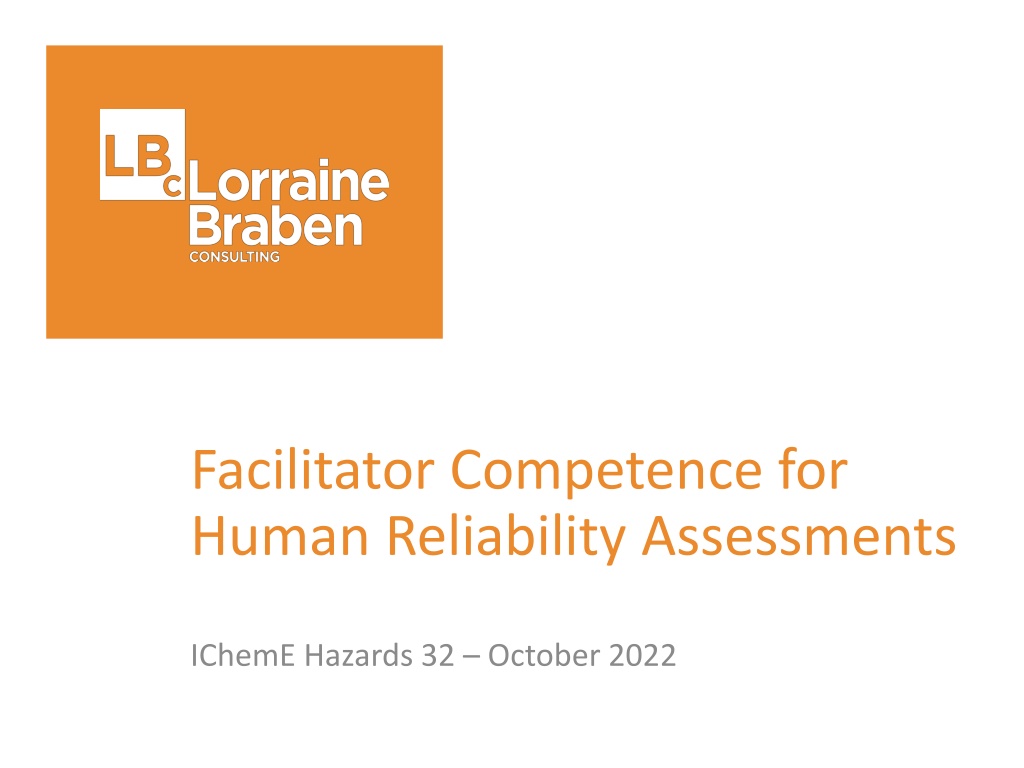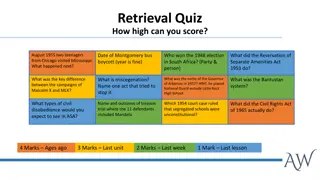Competence Framework for Human Reliability Assessments
This document outlines the importance of competence in facilitating Human Reliability Assessments (HRA). It includes guidelines on identifying and managing human errors, conducting competence assessments, and the role of an HRA facilitator in leading workshops. The framework emphasizes the need for underpinning knowledge, demonstrable skills, and suitable behaviors to ensure a credible analysis and effective risk management in HRA.
Download Presentation

Please find below an Image/Link to download the presentation.
The content on the website is provided AS IS for your information and personal use only. It may not be sold, licensed, or shared on other websites without obtaining consent from the author.If you encounter any issues during the download, it is possible that the publisher has removed the file from their server.
You are allowed to download the files provided on this website for personal or commercial use, subject to the condition that they are used lawfully. All files are the property of their respective owners.
The content on the website is provided AS IS for your information and personal use only. It may not be sold, licensed, or shared on other websites without obtaining consent from the author.
E N D
Presentation Transcript
Facilitator Competence for Human Reliability Assessments IChemE Hazards 32 October 2022
Purpose Provide a framework to demonstrate the competence for facilitating HRA workshops Meet UK regulator expectations Enable in-house HRA facilitation
Human Reliability Assessment Identification & Prioritisation of SCTs Step 1: consider main site hazards Step 2: identify manual activities that affect these hazards Step 3: outline the key steps in these activities Task Analysis Step 4: identify potential human failures in these steps Step 5: identify factors that make these failures more likely Step 6: manage the failures using hierarchy of control Step 7: manage error recovery Human Error Analysis
Competence Definition: the ability to undertake responsibilities and to perform activities to a recognised standard on a regular basis Competence Framework Underpinning knowledge Demonstrable skills Suitable behaviours Skills Knowledge Behaviour
Competence Assessment 3. Coaching those who have reached and exceeded the required standard and can coach others 2. Competent individuals who have reached the required standard without constant supervision Assessor Trained, experienced, knowledgeable, sufficient process understanding 1. Aware those who know what the required standard is and may achieve it under supervision Competence Framework 0. Unaware those who have not reached the require standard
Role of the HRA Facilitator Lead HRA Workshops: Apply HRA methodology Explain rationale for conducting HRA link to MAH scenarios Apply human factors knowledge to the analysis Ensure analysis is recorded correctly Manage subsequent workflow Solid knowledge of human factors principles Understanding of process safety risks Conduct a credible analysis Lead interactive workshop
Basic Principles Human Factors knowledge required! Consider Chartered HF Specialist as assessor Framework describes end point, not development path Training aligned to the organisational requirements Use framework as reference in training Can adapt assessment methodology Keep it consistent within an organisation
Pre-Requisites Assessee has completed Human Factors training Assessee has completed HRA training Assessee has participated in minimum number of HRA workshops Assessee feels ready for the assessment
Knowledge Elements Knowledge Assessment Describes the connection between safety critical tasks and MAHs Discussion Written Test Explain the different types of human failure Identifies PIFs and can explain their impact on human reliability Explains appropriate types of corrective actions for each failure type Describes the site process for conducting an HRA Describes how to construct an HTA Drawing Describes how to perform an HEA
Skill Elements Skills Assessment Prepares for the HRA Observation Introduces the HRA process to the team members Discussion Slide Pack Operates the relevant software effectively Constructs an accurate HTA Conducts an effective Walk Through/Talk Through Conducts an effective HEA Creates an HRA report to site standards Report Manages the workflow after the HRA workshop
Behavioural Elements Behaviours Assessment Demonstrates analytical thinking Observation Demonstrates strong meeting facilitation skills Provides a psychologically safe environment Demonstrates active listening and questioning skills Challenges the team s thinking Demonstrates curiosity in Human Factors approaches Mentoring
Psychological Safety in HRAs Definition: a climate in which people are comfortable expressing and being themselves Inclusion Safety Accepted and valued by the group Learner Safety Encouraged to learn and mistakes are accepted Contributor Safety Feel listened to and able to participate Challenger Safety Confident to challenge the status quo without reprisals
Conclusion Competence framework structured around HRA process to support process safety risk Robust demonstration of competence without needing to be chartered The assessor is required to be competent in Human Factors and HRA within a high hazard process environment
+44 (0)7972 461484 lorraine@brabenconsulting.co.uk www.brabenconsulting.co.uk












